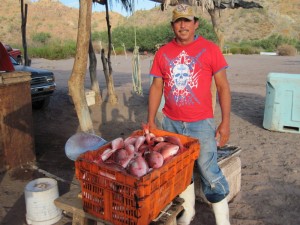A new geography of social-ecological sustainability
 Meeting human needs while sustaining ecosystems and the benefits they provide is a global challenge. Coastal marine systems present a particularly important case, given that >50% of the world’s population lives within 100 km of the coast and fisheries are the primary source of protein for >1 billion people worldwide. Our integrative analysis here yields an understanding of the sustainability of coupled social-ecological systems that is quite distinct from that provided by either the biophysical or the social sciences alone and that illustrates the feasibility and value of operationalizing the social-ecological systems framework for comparative analyses of coupled systems, particularly in data-poor and developing nation settings.
Meeting human needs while sustaining ecosystems and the benefits they provide is a global challenge. Coastal marine systems present a particularly important case, given that >50% of the world’s population lives within 100 km of the coast and fisheries are the primary source of protein for >1 billion people worldwide. Our integrative analysis here yields an understanding of the sustainability of coupled social-ecological systems that is quite distinct from that provided by either the biophysical or the social sciences alone and that illustrates the feasibility and value of operationalizing the social-ecological systems framework for comparative analyses of coupled systems, particularly in data-poor and developing nation settings.
This is the first step in what we hope will be an iterative improvement of quantitative, cross region comparisons guided by Ostrom’s social-ecological systems framework. Please contact Heather at heather.m.leslie(at)gmail.com to talk about how we can work together on this important effort.
